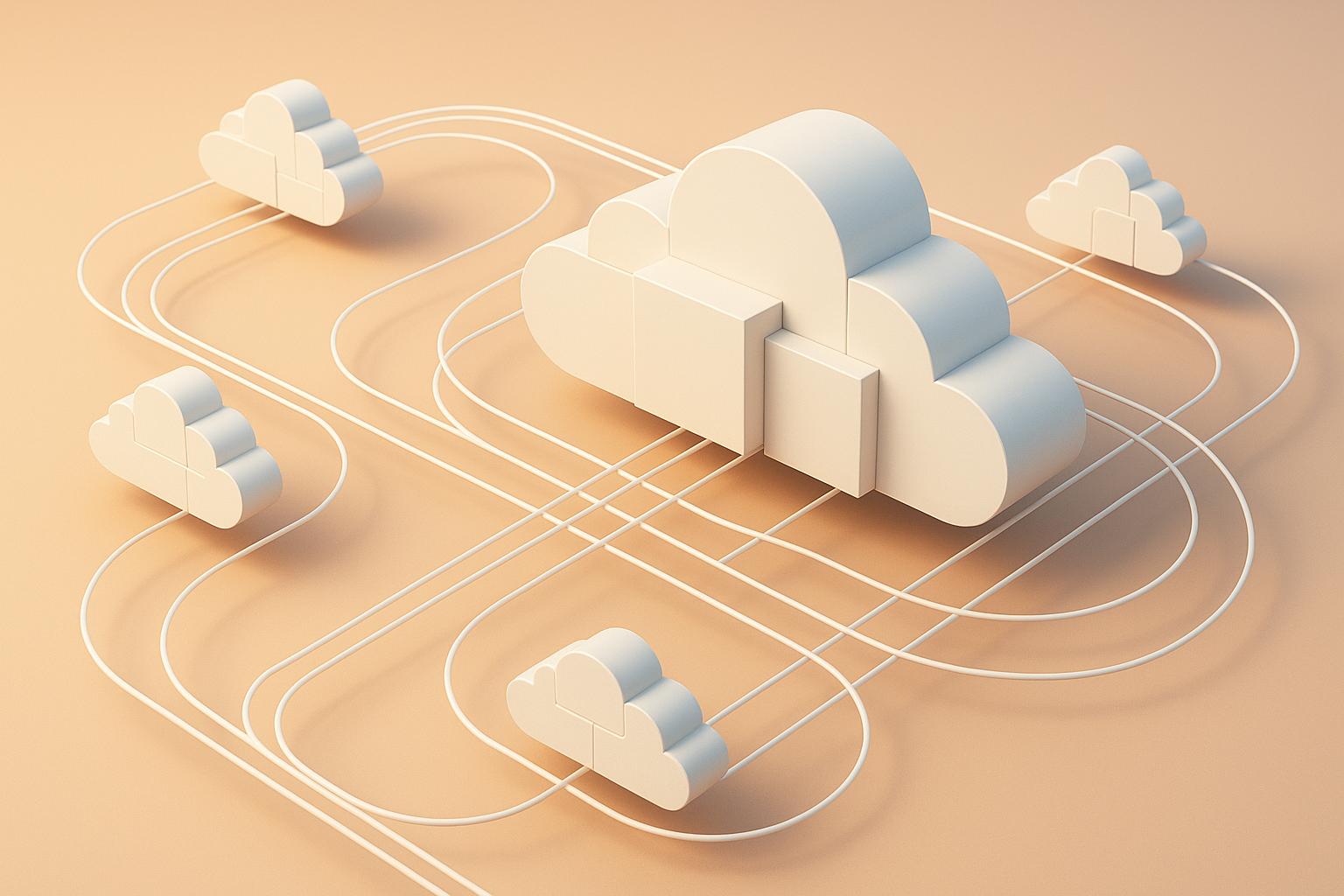
AI-Driven Software Development Trends in Alberta | Digital Fractal
Alberta is emerging as a hub for AI-driven software development, fuelled by government support, industry collaboration, and advancements in machine learning, natural language processing, and automation. Key highlights:
- Government Initiatives: Federal funding of $2.4 billion CAD and provincial grants are accelerating AI adoption. Programs like the AI Data Centre Concierge simplify regulatory processes for tech companies.
- Industry Applications: AI is transforming Alberta’s energy, construction, and public service sectors. Examples include predictive maintenance in energy, automated scheduling in construction, and workflow automation in public services.
- Key Technologies: Machine learning enhances predictive analytics, while natural language processing improves customer interactions and multilingual government services. Workflow automation is cutting costs and boosting efficiency across industries.
- Talent Development: Alberta’s workforce is being trained through post-secondary partnerships, micro-credential programs, and immigration pathways to meet the demands of AI innovation.
- Ethics and Regulations: Alberta adheres to federal privacy laws like PIPEDA, promoting responsible AI usage while waiting for AI-specific legislation.
Companies like Digital Fractal Technologies Inc. exemplify Alberta’s AI growth by offering custom solutions for energy, public service, and construction sectors. Alberta’s combination of funding, talent, and industry focus positions it as a leader in AI integration across Canada.
Main AI Technologies in Alberta’s Software Industry
Alberta’s software industry continues to evolve, fuelled by the province’s growing focus on AI innovation. Several key technologies have moved from experimental stages to become essential tools for businesses aiming to stay ahead in a competitive market.
Machine Learning and Deep Learning
Machine learning (ML) and deep learning have become the backbone of predictive analytics and automated decision-making in Alberta’s tech landscape. These technologies process massive datasets to forecast trends and simplify complex tasks.
In the energy sector, ML models are transforming equipment maintenance by offering predictive insights that help allocate resources more efficiently and cut down on downtime. Deep learning, on the other hand, is being used to interpret sensor data from oil and gas operations, uncovering patterns that might otherwise go unnoticed.
The public sector is also reaping the benefits. Deep learning is enhancing fraud detection and improving service delivery, allowing agencies to assess risks more accurately and respond faster. Additionally, AI-powered developer tools are making waves by reducing software development timelines by an estimated 25%. These tools can now explain code, automate test case generation, and even act as smart assistants for programmers.
AI’s role doesn’t stop at analytics – it’s also revolutionising how humans and computers interact, thanks to advancements in language processing.
Natural Language Processing and Generative AI
Natural language processing (NLP) and generative AI are reshaping how businesses handle customer interactions and create content. These technologies enable computers to understand and generate human language with impressive accuracy.
In Alberta, companies are leveraging NLP-driven chatbots to manage up to 70% of customer inquiries – a trend expected to hold steady through 2025. Generative AI tools are also transforming content creation. Marketing teams now use these systems to draft reports, create promotional materials, and even generate code snippets, saving time and resources. Since 2023, enterprise adoption of generative AI has doubled annually. Meanwhile, government services are tapping into NLP to provide multilingual support and personalised services, improving how they engage with citizens.
While these technologies enhance communication, their impact extends further by automating repetitive tasks and optimising workflows.
AI Workflow Automation
AI workflow automation is helping Alberta businesses streamline routine tasks and improve operational efficiency. These solutions are being used for data entry, document management, and IT maintenance, freeing up employees to focus on more strategic initiatives.
In the construction industry, AI-powered automation is revolutionising scheduling, resource management, and safety monitoring. By analysing project timelines, weather forecasts, and resource availability in real time, these systems help keep projects on schedule, even in unpredictable conditions.
A standout example is Digital Fractal Technologies Inc., which partnered with Xtreme Oilfield to create a mobile app and web platform. This solution digitised forms, automated permit processing, and streamlined field operations, showcasing the tangible benefits of AI in workflow automation.
AI is also making waves in supply chain management. By optimising complex workflows, businesses can cut costs by up to 20% annually. Integrating AI-driven processes with existing systems allows companies to maintain smooth operations while gradually introducing intelligent solutions that deliver immediate productivity boosts.
Industry Applications in Alberta
With advanced AI tools at their disposal, Alberta’s industries are finding innovative ways to boost efficiency and cut costs. From government offices to oil rigs and construction sites, these technologies are reshaping how work is done across the province.
Public Sector Digital Updates
The Alberta government is embracing AI with a dedicated public sector AI lab. This lab develops and tests AI solutions tailored for internal use, focusing on predictive analytics for resource allocation and automated systems for document classification. These tools have already streamlined operations, cutting processing times and improving the accuracy of resource forecasting. Early results highlight faster workflows and better service predictions, setting a strong example for other sectors to follow.
Energy Sector Advancements
In Alberta’s energy sector, AI is making a big impact by improving efficiency and cutting costs. Predictive maintenance systems, powered by machine learning, analyse sensor data to detect potential equipment failures before they happen. This proactive approach reduces downtime and enhances safety with automated incident detection. Some energy companies have seen maintenance costs drop by as much as 20% thanks to these systems. Beyond maintenance, AI-driven platforms are streamlining drilling schedules, monitoring energy usage, and forecasting production levels, helping companies operate more efficiently and reduce expenses.
Construction and Infrastructure
The construction sector in Alberta is also reaping the benefits of AI. Project management tools powered by AI automate scheduling, track progress in real time, and allocate resources more effectively. For example, AI-driven scheduling software can adapt timelines dynamically, while computer vision systems identify hazards in real time, reducing delays and workplace accidents. Companies like Digital Fractal Technologies Inc. are leading the charge by integrating AI into traditional construction workflows. Their solutions combine project timelines, weather forecasts, and resource availability to optimise resource management and enhance overall project execution.
AI Regulations and Talent in Alberta
As Alberta’s AI ecosystem continues to grow, ensuring ethical oversight and nurturing a skilled workforce remain key priorities. The province is striving to balance cutting-edge development with responsible governance through existing legal frameworks and targeted workforce initiatives.
AI Rules and Ethics
Currently, Alberta does not have a dedicated AI-specific law. Instead, it relies on broader federal and provincial regulations that address areas like privacy, consumer rights, human rights, and criminal law. On the federal level, the proposed Artificial Intelligence and Data Act (AIDA) could have been Canada’s first AI-specific regulation, but its progress has stalled indefinitely due to political delays. In the absence of such legislation, businesses operating in Alberta must adhere to existing privacy laws, including the federal Personal Information Protection and Electronic Documents Act (PIPEDA) and Alberta’s Personal Information Protection Act (PIPA). These laws impose strict rules on how personal data is collected, used, and stored in AI systems.
Ethical practices are also a key focus, with an emphasis on transparency, accountability, and fairness. Companies are encouraged to conduct regular risk assessments and adopt responsible AI practices to ensure their systems align with these principles. Alongside these governance efforts, Alberta is also investing in talent development to sustain its AI advancements.
Workforce Training Programs
Alberta has made significant strides in developing AI talent through a series of workforce training initiatives. The Alberta Technology and Innovation Strategy (2023–2025) aims to create 20,000 new technology jobs by 2030 and add $5 billion CAD in annual revenue. This strategy highlights the importance of micro-credential programs, apprenticeship-style learning, and work-integrated education in fields like computer science, IT, and data modelling. These programs are delivered in partnership with post-secondary institutions to ensure students gain practical skills that meet industry demands.
Collaboration between universities and industry plays a vital role, offering internships, research opportunities, and support for commercializing AI innovations. A public sector AI lab has also been established to provide hands-on experience for emerging professionals. To attract global expertise, Alberta has introduced an accelerated technology pathway under the Alberta Advantage Immigration Program.
Government-backed initiatives like Alberta 2030: Building Skills for Jobs, Alberta at Work, and the Major Innovation Fund further bolster workforce development. These programs focus on equipping workers with skills tailored to Alberta’s key sectors. For example, energy companies benefit from professionals trained in predictive maintenance and automated monitoring, construction firms gain access to experts in AI-driven project management and safety tools, and the public sector receives training for digital transformation efforts. Together, these initiatives ensure Alberta’s workforce is ready to meet the demands of its evolving AI landscape.
sbb-itb-fd1fcab
Digital Fractal Technologies Inc Overview
As Alberta continues to establish itself as a growing tech hub, Digital Fractal Technologies Inc. stands out as a prime example of the province’s commitment to AI-powered digital growth. The company is at the forefront of Alberta’s transformation, offering a range of AI-driven software solutions that include custom development, AI consulting, and comprehensive digital services – all of which align with Alberta’s ambitious technology goals.
The company leverages cutting-edge technologies like machine learning, natural language processing (NLP), and AI-powered workflow automation to address complex industry challenges.
Services and Technical Capabilities
Building on Alberta’s increasing focus on AI, Digital Fractal customizes its services to meet the specific needs of various sectors. Their offerings include custom mobile and web applications that integrate seamlessly with AI tools, enabling better data-driven decisions and streamlined operations.
Their AI consulting services cover a broad spectrum, including the development of machine learning models, computer vision applications, and NLP solutions. They also specialize in workflow automation, helping organizations eliminate inefficiencies and improve productivity.
In addition, the company designs custom CRM systems and business management tools that adhere to Alberta’s regulatory standards. For businesses looking to modernize, Digital Fractal provides legacy application migration services, ensuring critical systems and data remain intact during the transition.
Collaboration and adaptability are central to their development process. Through detailed needs assessments and an agile methodology, they deliver rapid prototypes, gather iterative feedback, and refine solutions to address the unique challenges faced by Alberta businesses.
Custom Solutions for Alberta Industries
Digital Fractal has developed tailored expertise in three key industries: public services, energy, and construction.
For the public sector, the company builds secure, compliant platforms that simplify citizen services and automate administrative tasks. Their solutions are designed to meet Canadian privacy laws, including PIPEDA, and incorporate ethical AI principles like transparency and fairness.
In the energy industry, Digital Fractal has delivered impactful results with applications focused on asset management, predictive maintenance, and real-time analytics. For instance, they revolutionized trucking operations for a leading Canadian energy service provider by automating manual processes with the Xtreme Oilfield mobile app and web-based backend system.
In Alberta’s construction and infrastructure sectors, the company has developed project management platforms and workflow automation tools. These solutions enable real-time collaboration, resource tracking, and compliance reporting, helping construction companies minimize delays, enhance safety standards, and improve team communication – ultimately driving significant productivity gains.
Summary
Alberta’s software development scene is making significant strides with the integration of AI, offering clear advantages for businesses ready to embrace it. The province is carving out a reputation as a global hub for technology and innovation, backed by major federal investments, including CAD$2.4 billion aimed at advancing private-sector AI initiatives.
AI is now woven into every stage of software development, from writing code to testing and ongoing maintenance. These advancements are delivering measurable value across Alberta’s key industries.
Local expertise is proving to be a game-changer in successfully adopting AI. Companies like Digital Fractal Technologies Inc showcase how Alberta-based firms are creating tailored solutions for regional challenges. For instance, their Xtreme Oilfield mobile app has revolutionized the energy sector by turning manual trucking operations into streamlined, automated workflows. This is a prime example of how pairing AI expertise with deep industry knowledge can lead to transformative results.
Beyond operational improvements, Alberta’s regulatory environment is also paving the way for growth. Business-friendly policies and ethical AI frameworks are in place to guide responsible development. The province is even setting up a public sector AI lab to nurture talent and create AI solutions for both government use and commercial applications. These efforts align with federal guidelines promoting responsible AI practices.
For Alberta businesses eyeing AI investments, the message is clear: focus on local expertise, automate workflows, and target industry-specific needs. With its strong roots in sectors like energy, construction, and public services, Alberta is well-equipped to deliver real productivity boosts and efficiency gains.
Thanks to a combination of government support, federal funding, skilled local talent, and proven industry applications, Alberta is emerging as a leader in practical AI adoption. Embracing AI-driven solutions not only cuts costs but also streamlines operations and strengthens competitive advantages.
FAQs
What initiatives has Alberta’s government introduced to support AI adoption across industries?
The Alberta government is taking active steps to encourage the use of AI, aiming to boost both innovation and economic development. This includes providing funding for research and development, forming partnerships with local universities and technology hubs, and investing in infrastructure tailored to AI advancements. These efforts are geared towards helping businesses adopt AI technologies to enhance their efficiency and stay competitive.
Alberta is also home to the Alberta Machine Intelligence Institute (Amii), an organization that works closely with businesses to implement AI solutions. These initiatives highlight Alberta’s dedication to becoming a frontrunner in AI adoption across sectors like energy, healthcare, and public services.
What are the main benefits and uses of AI-driven technologies in Alberta’s energy, construction, and public service sectors?
AI-powered technologies are reshaping Alberta’s energy, construction, and public service sectors by boosting efficiency, cutting costs, and supporting smarter choices. These advancements simplify intricate tasks, improve resource use, and strengthen safety protocols.
Take the energy sector, for instance. AI can track equipment performance and predict when maintenance is needed, helping to avoid unexpected downtime. In construction, it supports better project planning and real-time monitoring, keeping projects on track and within budget. Meanwhile, public services use AI to automate workflows and enhance data analysis, speeding up service delivery and improving accuracy. These innovations are helping industries tackle their specific challenges while running more efficiently.
What steps is Alberta taking to address ethical and regulatory challenges in AI and promote responsible usage?
Alberta is taking meaningful steps to tackle the ethical and regulatory complexities surrounding AI. By bringing together the government, industry leaders, and academic institutions, the province is driving collaboration to create clear guidelines for AI adoption. These efforts emphasize transparency in AI systems and strict adherence to privacy and data protection laws.
To further promote responsible AI use, Alberta is investing in research and innovation. By supporting ethical AI practices and offering resources to help businesses adopt AI responsibly, the province is working to establish itself as a frontrunner in developing AI that is both sustainable and accountable.

